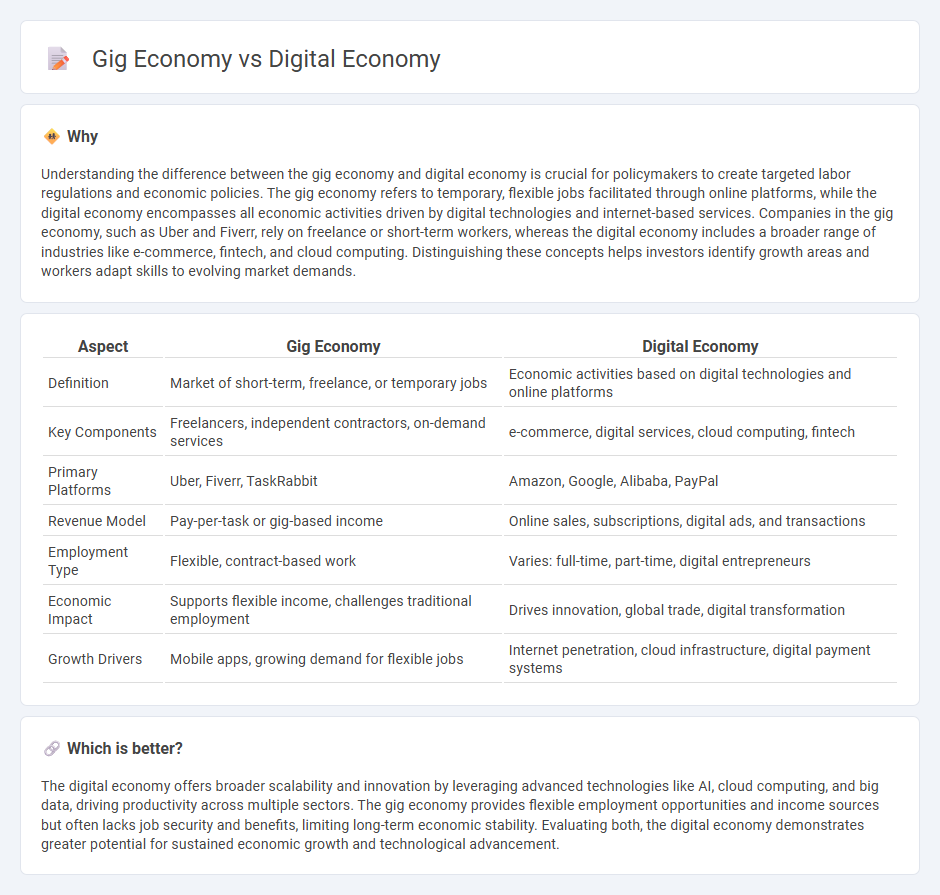
The gig economy is characterized by short-term, freelance, and contract-based work facilitated primarily through digital platforms like Uber, Fiverr, and TaskRabbit. In contrast, the digital economy encompasses a broader scope, including e-commerce, digital services, and data-driven industries that leverage technology to transform traditional economic activities. Explore the distinctions and impacts of these evolving economic models to understand their roles in shaping the future of work and commerce.
Why it is important
Understanding the difference between the gig economy and digital economy is crucial for policymakers to create targeted labor regulations and economic policies. The gig economy refers to temporary, flexible jobs facilitated through online platforms, while the digital economy encompasses all economic activities driven by digital technologies and internet-based services. Companies in the gig economy, such as Uber and Fiverr, rely on freelance or short-term workers, whereas the digital economy includes a broader range of industries like e-commerce, fintech, and cloud computing. Distinguishing these concepts helps investors identify growth areas and workers adapt skills to evolving market demands.
Comparison Table
| Aspect | Gig Economy | Digital Economy |
|---|---|---|
| Definition | Market of short-term, freelance, or temporary jobs | Economic activities based on digital technologies and online platforms |
| Key Components | Freelancers, independent contractors, on-demand services | e-commerce, digital services, cloud computing, fintech |
| Primary Platforms | Uber, Fiverr, TaskRabbit | Amazon, Google, Alibaba, PayPal |
| Revenue Model | Pay-per-task or gig-based income | Online sales, subscriptions, digital ads, and transactions |
| Employment Type | Flexible, contract-based work | Varies: full-time, part-time, digital entrepreneurs |
| Economic Impact | Supports flexible income, challenges traditional employment | Drives innovation, global trade, digital transformation |
| Growth Drivers | Mobile apps, growing demand for flexible jobs | Internet penetration, cloud infrastructure, digital payment systems |
Which is better?
The digital economy offers broader scalability and innovation by leveraging advanced technologies like AI, cloud computing, and big data, driving productivity across multiple sectors. The gig economy provides flexible employment opportunities and income sources but often lacks job security and benefits, limiting long-term economic stability. Evaluating both, the digital economy demonstrates greater potential for sustained economic growth and technological advancement.
Connection
The gig economy relies heavily on digital platforms and technologies that enable flexible, on-demand work arrangements, highlighting the integral role of the digital economy in facilitating real-time labor market transactions. Digital payment systems, online marketplaces, and communication tools form the backbone of gig work, driving economic activity through increased access to freelance opportunities and decentralized service delivery. This synergy accelerates economic innovation, reshapes labor dynamics, and expands market reach within the global economy.
Key Terms
Digital Platforms
Digital platforms serve as the backbone of both the digital economy and the gig economy, enabling seamless connectivity between consumers and providers while facilitating transactions across diversified digital services. The digital economy encompasses a broader spectrum of online commercial activities beyond gig work, including e-commerce, fintech, and digital media, all powered by platforms like Amazon, PayPal, and YouTube. Discover how digital platforms are transforming economic models and creating new opportunities in the evolving digital landscape.
Freelance Work
The digital economy has revolutionized freelance work by providing global platforms like Upwork and Fiverr that connect skilled professionals with clients worldwide, enhancing access and flexibility. In contrast, the gig economy emphasizes short-term, task-based jobs often mediated through apps such as Uber and TaskRabbit, focusing on immediate service delivery rather than long-term freelance projects. Explore how these economic models shape work opportunities and career growth in the evolving freelance landscape.
E-commerce
The digital economy integrates e-commerce platforms that enable seamless online transactions, enhancing global market access and driving innovation in payment systems and supply chain logistics. In contrast, the gig economy leverages digital tools to connect freelancers and short-term contractors with e-commerce businesses for tasks like delivery, customer service, and digital marketing, fostering flexible work arrangements and rapid service scalability. Explore further to understand how these economies collectively reshape modern commerce.
Source and External Links
Digital economy - Wikipedia - The digital economy is an umbrella term describing how traditional economic activities are transformed by internet and digital technologies, profoundly changing business structures, consumer behavior, and regulatory challenges globally.
What is the Digital Economy? | Definition from TechTarget - The digital economy involves economic activities connected through digital technologies, with key future drivers including AI, 5G connectivity, the metaverse, healthcare digitalization, and evolving cybersecurity measures.
What is digital economy? | Deloitte Malta - The digital economy is built on billions of online connections among people, businesses, and devices, transforming traditional industries through data-driven innovation and reshaping business models, exemplified by firms like Uber and Airbnb.
 dowidth.com
dowidth.com